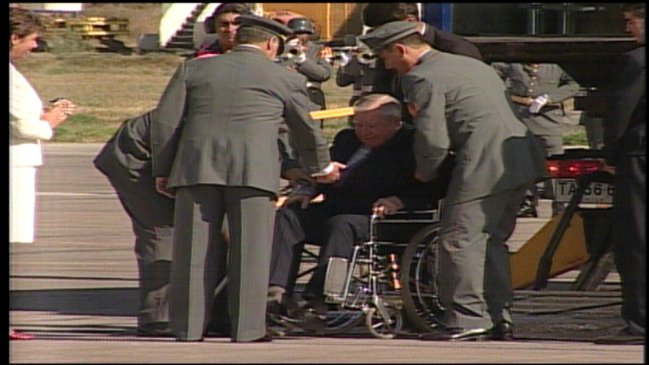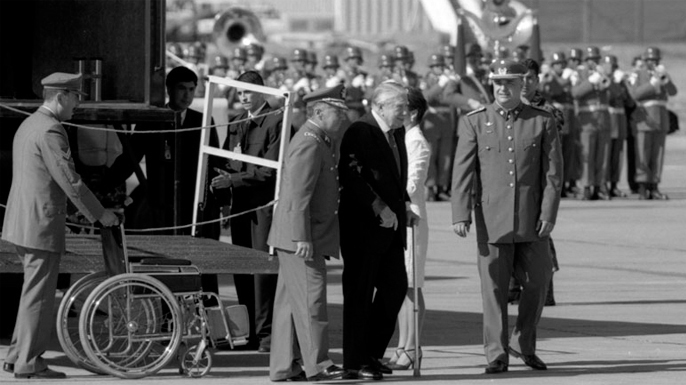El medio de investigación británico declassifieduk.org, acaba de dar mayor información sobre “cómo Gran Bretaña permitió que Pinochet escapara de la justicia por sus atrocidades”. Los hechos, giran en torno al 25 aniversario en que el gobierno del Reino Unido conducido por el laborista Tony Blair, permitió que el ex dictador de Chile evadiera su extradición a España fingiendo una enfermedad terminal y demencia, apañada por los propios ingleses. Archivos desclasificados revelan cómo se tomó la decisión.
El 2 de marzo de 2000, Augusto Pinochet caminó vacilante por la pista de la RAF Waddington en Lincolnshire y abordó un avión de la fuerza aérea chilena, marcando sus últimos pasos en suelo británico.
El ex dictador acababa de ser declarado no apto para ser juzgado por el ministro del Interior británico, Jack Straw, y se le permitió regresar a Chile con efecto inmediato.
Pinochet había pasado los 16 meses anteriores bajo arresto domiciliario en Gran Bretaña, esperando el resultado de una solicitud de extradición española por violaciones de derechos humanos cometidas bajo su régimen.
Entre 1973 y 1988, los agentes del Estado chileno fueron responsables de más de 3.000 muertes o desapariciones y de decenas de miles de casos de tortura y detenciones políticas. La solicitud de extradición de Pinochet por parte de España incluía cargos de asesinato y tortura.
La decisión del gobierno británico de permitir que Pinochet escapara de la justicia fue recibida con indignación, en particular después de que el déspota pareció mostrar signos milagrosos de recuperación a su llegada a Santiago.
Muchos sospecharon que se había llegado a un acuerdo político para permitir que Pinochet regresara a Chile bajo el amparo de un polémico informe médico que afirmaba que no había podido dar instrucciones a sus abogados.
Archivos recientemente desclasificados indican ahora cómo el proceso legal se había complicado por un acuerdo secreto hecho con Pinochet por Margaret Thatcher durante la década de 1980.
Thatcher, sugieren los archivos, había prometido al dictador asistencia médica en Gran Bretaña a cambio del apoyo militar y de inteligencia de Chile durante la Guerra de las Malvinas en 1982.
Los documentos muestran además cómo la idea de liberar a Pinochet por razones de salud se había discutido largamente a puertas cerradas, mientras las autoridades chilenas presionaban para encontrar una solución “humanitaria” a la crisis.

Jeremy Corbyn, diputado y destacado partidario de la campaña para la extradición de Pinochet, comentó: “Durante todo el tiempo hubo presión para permitir que Pinochet regresara… Se desarrolló una invención sobre su salud y nos dijeron que era un hombre que estaba perdiendo la memoria, que la edad se estaba apoderando de él y que no estaría en condiciones de enfrentar un juicio”.
"Sería vergonzoso si esto saliera a la luz"
La orden de arresto contra Pinochet se ejecutó poco antes de la medianoche del 16 de octubre de 1998 en la London Clinic, un hospital privado de la capital de Inglaterra.
Se emitió tan tarde en la noche porque “la inteligencia indicó que Pinochet planeaba abandonar el hospital y el país de manera inminente”, señala una nota informativa desclasificada de la Policía Metropolitana.
Los oficiales británicos vestidos de civil estacionados en el hospital también estaban “discretamente armados” para impedir la “fuga asistida de la custodia policial” de Pinochet hacia la cercana embajada chilena.
Mientras los agentes de policía cumplían con sus obligaciones legales, la noticia de la detención de Pinochet comenzó a llegar a Whitehall, desatando frenéticas discusiones internas que pronosticaban una posible tormenta política.
Uno de los despachos más notables fue enviado al entonces primer ministro británico Tony Blair por su principal secretario privado, John Holmes, el día del arresto de Pinochet.
“Deben saber que las autoridades españolas han solicitado la extradición del general Pinochet, quien se encuentra actualmente en Londres recibiendo tratamiento médico”, le informaron a Blair.
“La situación es más complicada de lo que parece”, continuó Holmes. “Aparentemente tenemos un acuerdo con él desde hace tiempo, debido a nuestra cooperación con los chilenos contra Argentina en el momento de la crisis de las Malvinas, de que lo ayudaríamos con el tratamiento médico en Londres”.
Holmes observó siniestramente: “Obviamente sería embarazoso si todo esto saliera a la luz”.
Por temor al expansionismo argentino -dice el medio-, el régimen de Pinochet había proporcionado a Gran Bretaña apoyo militar y de inteligencia durante la guerra de las Malvinas a cambio de lucrativos acuerdos de armas que incluían la venta de aviones Hawker Hunter y aviones de reconocimiento fotográfico Canberra.
Varios archivos sobre el apoyo del régimen chileno a Gran Bretaña durante la guerra siguen clasificados por el Ministerio de Defensa y el Ministerio de Relaciones Exteriores del Reino Unido.
A pesar de estas complicaciones, Holmes se mostró cautamente optimista respecto del caso Pinochet. “Con suerte, todo esto podría quedar en nada”, le dijo a Blair.
Holmes añadió: “El Ministerio del Interior comparte mi opinión de que lo mejor es que la solicitud de extradición no llegue a ninguna parte”, traicionando aparentemente la posición inicial de Jack Straw sobre el asunto.
Motivos compasivos
El optimismo de Holmes estaba fuera de lugar.
Pinochet fue puesto en arresto domiciliario mientras los tribunales británicos deliberaban sobre cómo proceder con la solicitud de extradición. La Cámara de los Lores dictó una sentencia histórica según la cual los ex jefes de Estado no podían gozar de inmunidad judicial por los crímenes internacionales más graves.
Durante todo este período, las autoridades chilenas presionaron constantemente al gobierno del Reino Unido para que liberara a Pinochet por razones “humanitarias”, al tiempo que enfatizaban que las relaciones entre el Reino Unido y Chile se dañarían si Pinochet era extraditado, según muestran los archivos desclasificados.
En noviembre de 1998, el ministro de Asuntos Exteriores chileno, José Miguel Insulza, se reunió con ministros británicos en Downing Street y les informó que su gobierno “quería defender la liberación por razones humanitarias”.
Pinochet era “un hombre enfermo de 83 años” y “debería ser liberado” por razones de salud, declaró.
Insulza señaló además que “Chile tenía mejores relaciones con el Reino Unido que con cualquier otro país europeo durante 150 años”, y que estas relaciones se verían dañadas por cualquier decisión de aprobar la extradición de Pinochet.
El presidente del Senado de Chile, Andrés Zaldívar, también presionó al gobierno del Reino Unido para que libere al ex dictador por razones humanitarias.
A principios de diciembre, Zaldívar le dijo a Blair que el Senado le había dado un “respaldo unánime” para presionar por la liberación de Pinochet, enfatizando cómo se deberían utilizar “factores políticos y humanitarios” para rechazar la extradición.
Los argumentos de las autoridades chilenas fueron respaldados en algunos aspectos por el asesoramiento jurídico interno proporcionado a Blair y Straw.
El 27 de noviembre de 1998, el ministro del gabinete Charles Falconer informó a Downing Street que la decisión de Straw sobre la extradición debería tener en cuenta cuestiones como “la salud de Pinochet” y “el efecto sobre otros países… si sentían que sus antiguos líderes podían correr ese riesgo”.
Falconer, quien está casado con la hija del ex embajador británico en Chile, David Hildyard, agregó: “El mérito de tratarlo ahora es que regresar ahora probablemente sería más fácil que después de una larga batalla judicial en la que se detallaron las atrocidades y Pinochet perdió”.
'Peligro nacional extremo'
No fueron sólo las autoridades chilenas las que presionaron para la liberación de Pinochet.
Margaret Thatcher escribió a Blair el 25 de noviembre de 1998 para declarar que “la decisión correcta ahora es actuar rápidamente para liberarlo y permitirle regresar a casa”.
Pinochet era “un hombre viejo y enfermo al que sólo por compasión se le debía ahorrar lo que de otro modo le depararía el futuro”, declaró.
Refiriéndose a la guerra de las Malvinas, Thatcher agregó que “sólo podría dañar la reputación de este país si se sabe que aquellos, como el senador Pinochet, que fueron nuestros amigos cercanos en tiempos de extremo peligro nacional, pueden esperar posteriormente ser tratados de esta manera”.
Incluso el Vaticano intervino. Evidentemente, durante el papado de Juan Pablo II.
Pocas semanas después de la detención de Pinochet, el equivalente al ministro de Asuntos Exteriores de la Santa Sede escribió a Blair para subrayar su convicción de que “existen todos los requisitos para un gesto humanitario en favor de un hombre de 83 años que está enfermo y que había ido a Londres para una operación grave”.
A mediados de 1999, la presión combinada sobre el gobierno del Reino Unido para liberar a Pinochet pareció dar frutos cuando se llegó a un acuerdo entre Chile, Francia, España y el Reino Unido para que Straw rechazara el pedido de extradición y “devolviera a Pinochet a casa por 'razones humanitarias'”.
Según se informa, el secretario de Asuntos Exteriores del Reino Unido, Robin Cook, le dijo a su homólogo español, Abel Matutes, que “no dejaría que [Pinochet] muriera en Gran Bretaña”, a lo que Matutes respondió: “No le dejaré venir a España”.

Tras su regreso a Chile, Pinochet se convirtió en blanco de numerosos procesos judiciales relacionados con violaciones de los derechos humanos y corrupción. Sin embargo, nunca fue condenado y murió en 2006.






